Please Note: This review of the demo/prototype game might change slightly based on the success of the Kickstarter campaign. The game is being reviewed on the components and the rules provided with the understanding that “what you see is not what you might get” when the game is published. If you like what you read and want to learn more, we encourage you to visit the game publisher’s website or the Kickstarter campaign. Now that we have all that disclaimer junk out of the way, on with the review.
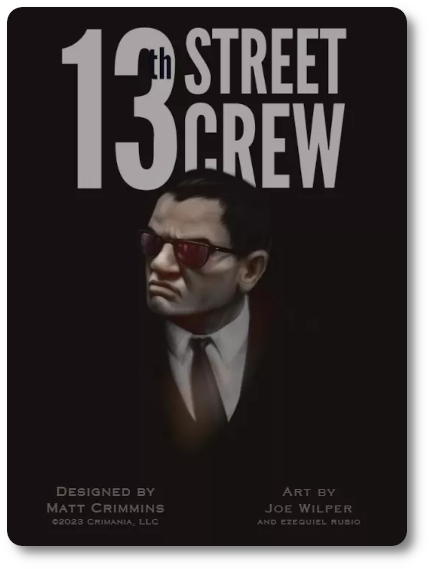
The Basics:
- For ages 10 and up (publisher suggests 12+)
- For 3 to 7 players
- Approximately 60 minutes to complete
Geek Skills:
- Active Listening & Communication
- Counting & Math
- Logical & Critical Decision Making
- Reading
- Memorization
- Strategy & Tactics
- Risk vs. Reward
- Cooperative & Team Play
- Hand/Resource Management
- Self-confidence
- Imagination
- Bluffing and Misdirection
Learning Curve:
- Child – Easy
- Adult – Easy
Theme & Narrative:
- Balance your ambition and greed as you climb up the ranks of a criminal syndicate or attempt to topple it
Endorsements:
- Gamer Geek approved!
- Parent Geek approved!
- Child Geek approved!
Overview
It’s not personal. It’s business. Yeah, you may break a rule or two, even several laws. And, sure, you sometimes have to flex a bit of muscle when you smile, but it’s never personal. It’s about the money and the power and the respect. If you want your crew to be recognized before the Old Don, you must show you can earn. Take the jobs and cash in, but be careful. Greed has a way of making friends into enemies. Just keep telling yourself it’s only business. But if you need to, make it personal.
13th Street Crew, designed by Matt Crimmins and to be published by Crimania Games, will reportedly be comprised of 48 Resource cards, 45 Police Action cards, eight Loyalty cards, 48 Job cards, and 42 Poker chips. As this is a review of a prepublished game, I cannot comment on the game component quality. I can state, however, that the artwork provided and to be included by the talented artists Ezequiel Rubio and Joe Wilper, further reinforces the game’s theme brilliantly.
Preparing for A Little Crime
To set up 13th Street Crew, complete the following steps:
First, take the Job cards and separate them into three different decks. These will be “Big Jobs,” “Small Jobs,” and “Solo Jobs” draw decks. Once separated, shuffle each separately and place face-down in the middle of the playing area in a column. Then, flip the top three cards from each and put those face-up in the row. When completed, there should now be nine visible jobs. These face-up cards are referred to as “active jobs.”
Second, shuffle the Resource cards to create the Resource draw deck. Deal three Resource cards to each player face-down. Players may look at their Resource cards but should keep them hidden. Place the remaining cards in the Resource draw deck on the table face-down.
Third, give one “Police Presence” Police Action card and one “All Clear” Police Action card to each player. These should remain face-down in front of the player at this time. Place the remaining Police Action cards back in the box but available if needed. Next to the game box, place the Poker chips into a pile and within easy reach of all the players.
Fourth, take the Identify cards and the necessary number of “Loyal Crew” and “Informant” cards. The number of cards is dependent on the number of players. Shuffle these cards and deal one to each player, face-down. Players should look at these cards but keep them hidden for now. Like the Police Action cards, place any remaining Identity cards face-down back in the box, but available if needed.
That’s it for game setup. Determine who will be the first round’s “Lead Player” and begin!
Know Your Place
At the start of the game, each player was dealt an identity card. This indicates if the player is a Loyal Crew Member or an Informant.
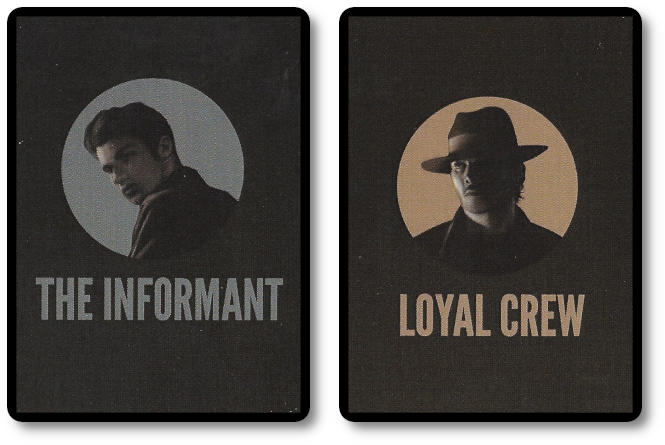
Victory is different for the player depending on their identity. The Loyal Crew Members want their criminal enterprise to grow and make as much money as possible without police intervention. On the other hand, the Informant seeks to ensure they stay on the good side of the Law while making a few bucks.
Since Identity cards are dealt secretly, no player will know who is who. Not at first, at least, as some card special abilities allow players to peek at another player’s Identify card. Remember that there is only a possibility of an Informant in the crew, not a certainty.
It pays to be paranoid, however. Watch your fellow crew members for any signs of being a rat.
It’s About the Money…
13th Street Crew is played in rounds. In each round, one player will be the “Lead” and play cards and organize a team. While the “Lead Player” will trigger the actions and move the round forward, all players will participate. A game round is summarized here.
Step One: Resset and Possibly Use Assets
The first thing the “Lead Player” does is ask all players in the game to reset their Assets.
Assets provide players with unique actions and abilities. Assets are acquired by completing Jobs. When an Asset is used, it is flipped over to indicate it is no longer available. If any player has a flipped-over (face-down) Job card in front of them, they flip it over so the card is face-up.
Once all the Assets are visible, each player, in turn-order sequence, starting with the “Lead Player,” may decide to use their Asset and resolve its action or reserve it for later.
Step Two: Draw One Resource Card
Resource cards represent the various tools, contacts, and access to getting favors that always come in handy when trying to break the law without making a scene. Each player is limited to a maximum hand size of seven Resource cards at any time. Each player will draw a Resource card, evaluate it, and keep it if they have less than seven cards in their hand or can immediately discard a Resource card of their choice if the new Resource card goes over the maximum hand size limit.
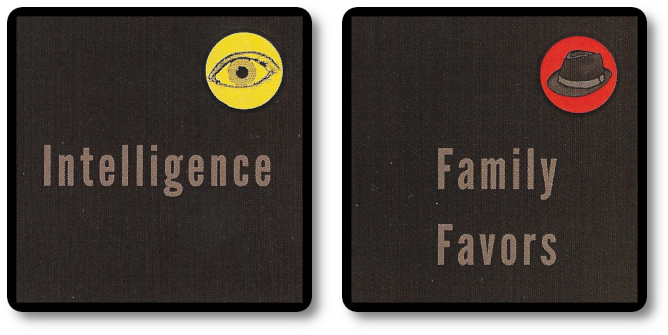
Players should never reveal or openly discuss the specifics of what Resource cards they hold. However, the total number of Resources a player has at any time is public knowledge.
Step Three: Pass or Propose a Job
The “Lead Player” must now make a choice. They can either pass on a job this round or suggest a job to be taken by the 13th Street Crew.
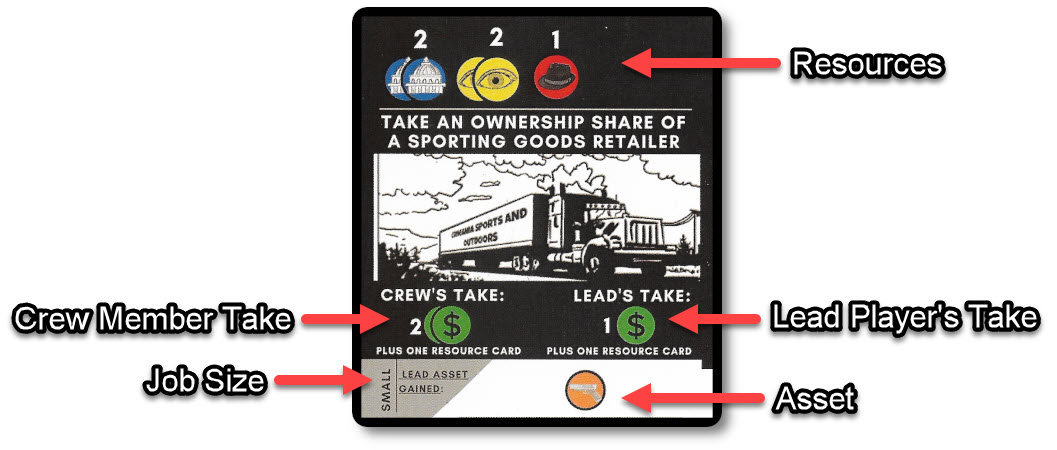
If the “Lead Player” passes, all the players draw an additional Resource card (hand size limit still counts). Then, the “Lead Player” may select any face-up card in the “Active Jobs” and move it to the bottom of its draw deck. Then, draw a new Job card, replacing the previously removed one. This ends the round. The next player in the turn-order sequence player is the “Lead Player.” The new “Lead Player” starts the round by taking step one, as previously noted.
If the “Lead Player” likes one of the jobs available to them, they take that job and rotate it so it is obvious to all that the job is being proposed. The “Lead Player” need not take any input from any other player when they select the job of their choice.
If the “Lead Player” wants to take on a Job going solo, they are welcome. They identify the “Solo” Job card they want to work on.
Step Four: Assemble a Crew for Big and Small Jobs
“Solo” Jobs are a crew of one and do not need additional crew members to pull off. This step should be skipped if a “Solo” Job is selected.
“Big” and “Small” Jobs represent various criminal activities that require two or more crew members to work simultaneously. “Small Jobs” require a minimum of two players, and “Big Jobs” require a minimum of three. The “Lead Player” asks the other players who wants to join. The job can be attempted if enough players elect to participate to meet the crew member number requirement.
Each Job provides the required Resources needed to pull off the caper. Players should look at their Resource cards and offer a general sense of what they can provide to the Job. For example, “I can provide a good deal towards this job,” or “I cannot provide much, but I can assist.” The idea here is that each player – without showing what they have available – helps the other players who want to understand what they should contribute. Feel free to banter back and forth, but never be specific.
Of course, none of the players may want to join the “Lead Player” on the proposed Job, or not enough players want to contribute to meet the crew member’s minimal requirements. If this is the case, the proposed Job goes to the bottom of its draw deck, and a new Job card is drawn, replacing the previously removed one. This ends the round. The next player in the turn-order sequence is the “Lead Player.” The new “Lead Player” starts the round by taking step one, as previously noted.
Step Five: Put Job Together
Congratulations! You have a crew who are willing to help with the Job! All players, starting with the “Lead Player,” now place all the Resource cards they care to provide to assist in the Job. Once the last player who volunteered to go on the Job adds their Resource cards (if any), evaluate if the Job Resource requirements have been met. Of course, if the “Lead Player” decides to go solo, they are the only ones playing Resource cards.
If the Job Resource requirements have not been met, all the Resource cards played are collected and discarded. The failed Job goes to the bottom of its draw deck, and a new Job card is drawn, replacing the previously removed one. This ends the round. The next player in the turn-order sequence is the “Lead Player.” As previously noted, the new “Lead Player” starts the round by taking step one.
If requirements have been met, all the Resource cards used are collected and discarded. Next, we must see if anyone knew the crime was in progress.
Step Six: Check for Police Action
The players did the crime, but will they do the time? It all depends if the Police are aware of the misdeeds!
Each player who participated in the Job now secretly selects one of their two Police Action cards and places it face-down in front of the “Lead Player.” The topmost card on the Police Action card is also drawn and added without looking at it. The “Lead Player” collects all the Police Action cards, shuffles them (without looking at them), and then turns each Police Action card over, face-up, one at a time.
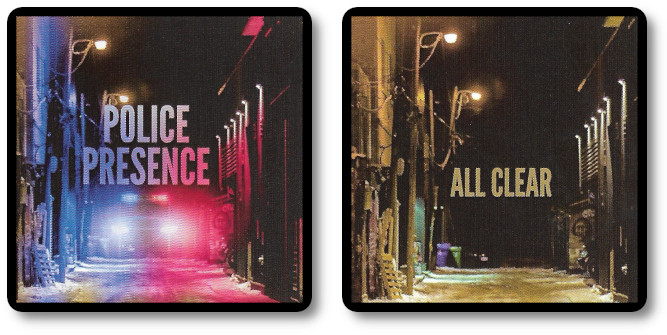
If the player elects to complete a “Solo” Job, they are the only ones to place a Police Action card of their choice, but they still draw a Police Action card, adding it for a total of two Police Action cards for the “Solo” Job.
If a”Police Presence” card is revealed at any time, the Job fails. The “Police Presence” card remains in play and face-up. All other Police Action cards revealed or not, are turned face-down. The Police Action cards not used by the players who participated in the Job are also handed over. The cards are shuffled – without anyone seeing them – and put back into the Police Action deck in the box. Each player who participated in the Job is then dealt a new “Police Presence” and “All Clear” Police Action card. The failed Job goes to the bottom of its draw deck, and a new Job card is drawn, replacing the previously removed one. This ends the round. The next player in the turn-order sequence is the “Lead Player.” As previously noted, the new “Lead Player” starts the round by taking step one.
If no “Police Presence” is revealed, with all shown cards stating “All Clear,” the Job succeeds! The “Lead Player” takes the “Lead’s Take” and collects the Job cards if an Asset is to be obtained. All other players who contributed are considered crew and collect what is listed as the “Crew’s Take.” The “All Clear” cards are returned to the players who participated, with the extra being shuffled back into the Police Action deck.
Regardless of the outcome, the turn ends!
Making Crime Pay
The game continues as noted above, with each player taking turns per round as the “Lead Player” until one of two conditions is met.
- A player has amassed $15,000 or more at the end of the round
- A fifth “Police Presence” Police Action card is revealed
Players now reveal their Identify cards.
A Loyal Crew Member can win if they collected the most money and did so before the fifth “Police Presence” Police Action card is revealed. Ties are a shared victory.
The Informant can win if they are the first to make $15,000 or more before anyone else or if the fifth “Police Presence” Police Action card is revealed.
Of course, if there were no Informants in the game and the fifth “Police Presence” Police Action card is revealed, all the players lose.
Game Variant
If a shorter game is required or requested, find and place one of the “Small Job” protection racket cards immediately in play. These Jobs award the players $1000 each turn! This will directly seed players with a great deal of money and make it all the easier to reach the $15,000 requirement.
To learn more about 13th Street Crew, visit the game publisher’s website or the Kickstarter campaign.
Final Word
 The Child Geeks had a wonderful time playing 13th Street Crew, finding the rules straightforward to understand, the game quick to play, and the gameplay wonderfully engaging. One Child Geek said, “I really liked the game and how no one knew who was who. But it didn’t matter because we were all out to make as much money as possible. You have to trust each other but not fully trust each other.” Another Child Geek reported, “I was the Informant in one game and a Loyal Crew Member in another. They were both enjoyable games to play. You can easily hide in a group when no one trusts each other. I liked that I made everyone a suspect!” When the last job was done, the Child Geeks took a vote and decided that 13th Street Crew was a great crew to belong to.
The Child Geeks had a wonderful time playing 13th Street Crew, finding the rules straightforward to understand, the game quick to play, and the gameplay wonderfully engaging. One Child Geek said, “I really liked the game and how no one knew who was who. But it didn’t matter because we were all out to make as much money as possible. You have to trust each other but not fully trust each other.” Another Child Geek reported, “I was the Informant in one game and a Loyal Crew Member in another. They were both enjoyable games to play. You can easily hide in a group when no one trusts each other. I liked that I made everyone a suspect!” When the last job was done, the Child Geeks took a vote and decided that 13th Street Crew was a great crew to belong to.
 The Parent Geeks were also impressed, finding the engagement level at the table between the players to be a perfect match of cooperation and mistrust. According to one Parent Geek, “I liked this game. I’ve played many other hidden role games, and they all have their little way of making players work together and against each other. I found this approach of hidden identities to be very reminiscent of the movie Reservoir Dogs, and I couldn’t help but smile the entire time we played.” Another Parent Geek said, “A lot of fun with a mixed group of players, both age and experience-wise. I was very impressed with how much control the players had and yet still had little in the way of true knowledge. You must learn to trust in a cloud of distrust, which is difficult, but it was fun!” When the last Police car disappeared in the distance, the Parent Geeks took a vote and decided that 13th Street Crew stole their imagination.
The Parent Geeks were also impressed, finding the engagement level at the table between the players to be a perfect match of cooperation and mistrust. According to one Parent Geek, “I liked this game. I’ve played many other hidden role games, and they all have their little way of making players work together and against each other. I found this approach of hidden identities to be very reminiscent of the movie Reservoir Dogs, and I couldn’t help but smile the entire time we played.” Another Parent Geek said, “A lot of fun with a mixed group of players, both age and experience-wise. I was very impressed with how much control the players had and yet still had little in the way of true knowledge. You must learn to trust in a cloud of distrust, which is difficult, but it was fun!” When the last Police car disappeared in the distance, the Parent Geeks took a vote and decided that 13th Street Crew stole their imagination.
 The Gamer Geeks were just as impressed as the other two groups, finding 13th Street Crew a tight game full of enjoyable twists and turns. As one Gamer Geek put it, “What the game does right is constantly have the player reevaluate their stakes by counting their money and balancing it against their personal goals. This continual need to make money and play the odds was a very entertaining way to keep me involved.” Another Gamer Geek said, “A pretty standard hidden role game with a unique way of having the players participate against each other and the game. I found it very refreshing and enjoyed every second of it. I highly recommend it.” When money was counted, the Gamer Geeks all agreed that their time and attention was well spent.
The Gamer Geeks were just as impressed as the other two groups, finding 13th Street Crew a tight game full of enjoyable twists and turns. As one Gamer Geek put it, “What the game does right is constantly have the player reevaluate their stakes by counting their money and balancing it against their personal goals. This continual need to make money and play the odds was a very entertaining way to keep me involved.” Another Gamer Geek said, “A pretty standard hidden role game with a unique way of having the players participate against each other and the game. I found it very refreshing and enjoyed every second of it. I highly recommend it.” When money was counted, the Gamer Geeks all agreed that their time and attention was well spent.
 13th Street Crew was a great deal of fun to play and teach. The game is straightforward in its approach to conducting and concluding rounds. Each round, in fact, always had the players leaning forward to see how successful the Jobs would be and what Jobs were selected. Remember that the Informant can win if they make the most money first or if no other player gets the required amount by the time the fifth “Police Presence” Police Action card is revealed. This led many players to consider which Jobs their counterparts were selecting carefully. There was so much information at any particular time at the table to help players determine “who is who” that it was somewhat overwhelming.
13th Street Crew was a great deal of fun to play and teach. The game is straightforward in its approach to conducting and concluding rounds. Each round, in fact, always had the players leaning forward to see how successful the Jobs would be and what Jobs were selected. Remember that the Informant can win if they make the most money first or if no other player gets the required amount by the time the fifth “Police Presence” Police Action card is revealed. This led many players to consider which Jobs their counterparts were selecting carefully. There was so much information at any particular time at the table to help players determine “who is who” that it was somewhat overwhelming.
But I think that was part of the game’s charm and point. You know more than you think you know about each other player, but that sum of knowledge won’t ensure victory or an easier road to travel. This constant state of knowing what you don’t know and trying to reconcile that with your decisions made the game a real gem. Too often, I thought I knew what a player would do, only to be stupefied by a complete change in their behavior or what I thought was a possible bluff. Of course, it didn’t matter at the end of the game because every player needs to focus on making that money, baby!
Do try this fantastic game when the time and opportunity present itself. I have also played many hidden role games, and I can easily say that 13th Street Crew brings something new to the table that makes it worthwhile. Criminal? Certainly not, but it did steal our hearts.
This is a paid-for review of the game’s final prototype. Although our time and focus were financially compensated, our words are our own. We’d need at least 10 million dollars before we started saying what other people wanted. Such is Father Geek’s statuesque and legendary integrity, which cannot be bought except by those who own their private islands and small countries.




I played this game at a Game Center in my town where it was being tested to find if it needed any changes and suggestions of the participants about the game. I found it to be fun and different from other games that I have played. If you try the game it is a lot of fun.